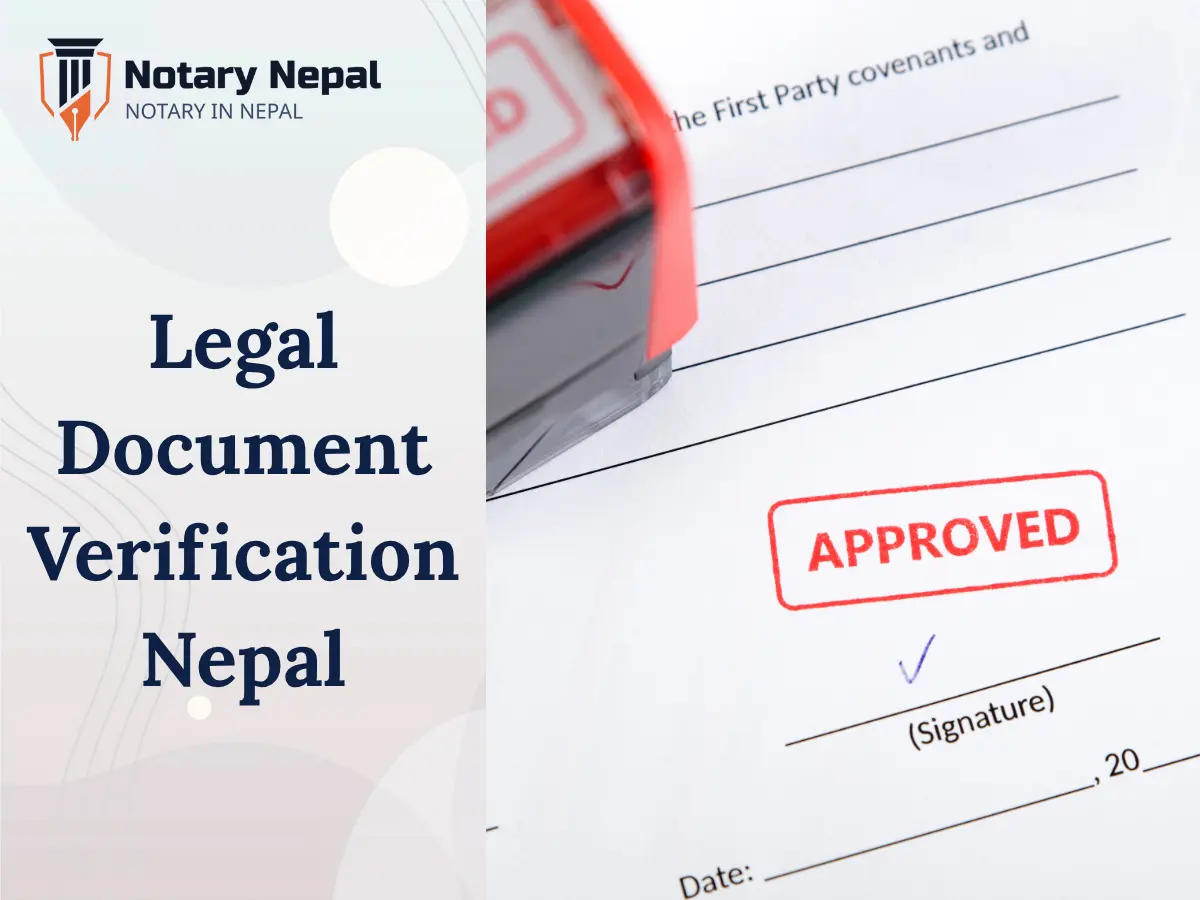

Table of Contents
In today’s interconnected and compliance-driven world, legal document verification is essential for individuals and organizations operating in Nepal. Whether you're applying for a visa, enrolling in a foreign university, signing a business contract, or authenticating your personal credentials, ensuring your documents are legally verified and recognized is a vital step.
This guide explores how document verification works in Nepal, who needs it, the different types of documents that require it, and how to navigate the system efficiently—both online and offline.
Why Legal Document Verification Matters in Nepal
Nepal’s increasing engagement with the global economy, education, and migration has led to a surge in the need for legal documentation. Embassies, foreign universities, multinational employers, and government institutions all require verified documents to ensure authenticity and prevent fraud.
Verification adds legal weight and international recognition to your documents. It also ensures:
Compliance with legal and administrative requirements
Protection against identity or academic fraud
Acceptance by embassies, employers, or educational institutions
Common Scenarios Requiring Document Verification
Visa and Immigration Applications
Foreign University Enrollment
Job Applications Abroad
Business Registration or Expansion
Property Sale or Ownership Transfers
Court Submissions or Litigation
Key Types of Documents That Need Verification
Academic Documents
Academic certificates
Transcripts
Degrees and diplomas
Personal Documents
Citizenship certificate
Birth and marriage certificates
Death certificates
Police clearance reports
Legal Documents
Affidavits
Power of attorney
Legal declarations
Court judgments
Commercial Documents
Company registration papers
Tax clearance certificates
Trade licenses
Commercial invoices and MOUs
Where to Verify Legal Documents in Nepal
Nepal offers several channels for document verification, depending on the type and destination of the document:
1. Notary Public Offices
Certified notaries verify and stamp legal documents for domestic and some international use.
2. Ministry of Foreign Affairs (MOFA)
MOFA handles authentication and apostille for documents required by foreign embassies and international organizations.
3. Embassy or Consulate Legalization
Certain documents, particularly for visa and migration, must be legalized or attested by the concerned embassy.
4. Local Ward Offices
Used for verifying civil documents such as birth, residence, or unmarried status certificates.
Step-by-Step Guide to Legal Document Verification
Step 1: Determine the Type of Document
Identify if your document is academic, legal, personal, or commercial.
Step 2: Select the Appropriate Authority
Choose between a Notary Public, MOFA, local ward office, or embassy based on your needs.
Step 3: Prepare Required Documents
Bring original copies, photocopies, a valid ID, passport-sized photos, and application forms.
Step 4: Submit and Pay Fees
Submit documents either in person or online (where available). Pay the required processing fee.
Step 5: Receive Verified Document
Documents are typically verified within 1 to 5 working days, depending on the authority.
Online Legal Document Verification in Nepal
Modernization has enabled several authorities and service providers to offer digital verification options:
Benefits of Online Verification:
Faster turnaround
No need for physical visits
Track progress in real time
What You Can Verify Online:
Academic transcripts (through university portals)
MOFA attestation status
Property and citizenship details
Personal documents via e-citizen platforms
Embassy Legalization and MOFA Attestation
For international use, particularly immigration or education abroad, many documents require:
MOFA Attestation
Done at MOFA in Kathmandu or its branches
Recognized globally
Embassy Legalization
Applies when receiving country is not a member of the Hague Apostille Convention
Requires prior MOFA attestation
Documents such as birth certificates, educational credentials, and police reports must pass through these two steps to gain full international acceptance.
Challenges in Legal Document Verification
While Nepal has made strides in improving document verification, challenges remain:
Lack of digitization across all municipalities
Regional differences in processing time
Miscommunication between offices and applicants
Inconsistent verification fees and guidelines
These factors often lead to delays and added stress for applicants.
Tips for a Smooth Verification Process
Always bring original documents and copies
Know which authority is responsible for your type of document
Check embassy requirements for document format and language
Use certified translation services for foreign-language documents
Keep buffer time before your application deadline
English and Multilingual Translation for Verified Documents
Most embassies and international institutions require documents to be in English. Certified translation is thus a crucial part of the process.
Services Offered by Translation Agencies:
English translation of Nepali documents
Translation of legal, academic, and financial documents
Certified, notarized, and embassy-accepted translations
Case Studies
Case Study 1: University Application
A student applying to a Canadian university needed notarized transcripts, certified English translations, and MOFA attestation. The documents were processed in 7 days, and the university accepted them without issue.
Case Study 2: Business Expansion
A startup registering for international trade used translated and verified tax clearance documents and a trade license. MOFA and embassy processing were completed within 10 working days, enabling successful onboarding with their foreign partner.
Case Study 3: Immigration Visa
A couple applying for Australian migration used Notary Nepal’s legal document verification and translation service. The documents were reviewed, notarized, and accepted by the embassy with no delays.
Choosing the Right Legal Document Verification Provider
When selecting a legal service provider or notary office:
Check their licensing and certification
Verify turnaround time and experience
Look for embassy acceptance track record
Ensure they offer translation + verification in one place
Read reviews and request sample formats
Conclusion: Empowering Your Legal Journey
Legal document verification in Nepal is no longer a cumbersome, confusing process. With the right knowledge and service provider, individuals and organizations can navigate it with confidence.
Whether you’re planning to study abroad, invest internationally, or just need peace of mind—verifying your documents with trusted professionals ensures your efforts are recognized and respected globally.
For secure, fast, and embassy-approved verification, choose reliable partners like Notary Nepal, where accuracy meets legality.
For Consultation: +977-9765979296
Website: www.notarynepal.com
Email: info@notarynepal.com
Notary Nepal – Nepal’s Trusted Name for Legal Document Verification & Certification
This article is for informational purposes only and does not constitute legal advice, advertisement, or solicitation. Notary Nepal and its team are not liable for any consequences arising from reliance on this information. For legal advice, please contact us directly.


